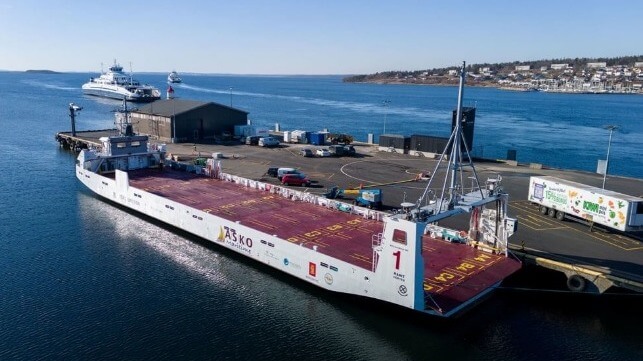Electric Ro-Ro Freight Ferries Add LEO to Expand Autonomous Tests

Two cargo barges introduced two years ago to ferry trailers across Norway’s Oslo fjord are set to begin their next phase of trials. Kongsberg Maritime which is operating the vessels reports in a collaborative project with Norwegian telecommunications provider Telenor Maritime, the barges will be equipped with Eutelsat OneWeb new flat panel antenna system for a trial that aims to expand shipboard connectivity.
The barges were built at India’s Cochin Shipyard and completed in June 2022 to operate for ASKO, a Norwegian grocery company. Each vessel can carry 16 trailers, each with a maximum capacity of 29 tons, and they are traveling between Horten and Moss on the fjord. ASKO reported that it runs up to 800 trailer trucks each day as part of its logistics operation. The barges save distance and fuel crossing the fjord and the longer-term plan anticipates a fleet of the vessels also operating along the coast. Annually ASKO reports it is reducing road travel by more than 1.2 million miles annually and reducing emissions by 5,000 tons.
Measuring approximately 220 feet in length, the barges are fully electric powered by a 1,846 kWh battery. Each vessel weighs approximately 600 tons. Tests began in the fall of 2022, and once fully certified, they will operate controlled by an onshore center using technology from Massterly, a joint venture between Wilhelmsen and Kongsberg. They are part of a new concept to use automation to expand efficiency and sustainability of operations.
The next round of testing for the two vessels calls for them to be remotely controlled from the Remote Operation Center. One of the challenges however remains connectivity.
“Seamless connectivity remains one of the key challenges for remote and autonomous operations, particularly in the open oceans,” said Pål André Eriksen, Senior Vice President, Remote & Autonomous Solutions at Kongsberg Maritime. “Overcoming the challenges of global connectivity and available bandwidth will unlock great potential for the deployment of such technologies in the future."
According to the companies, overcoming the connectivity issues will unlock the next phase of the project and expand the applicability of the technologies. Knut Fjellheim, CTIO of Telenor Maritime says they are on the cusp of achieving 100 percent uptime for ship connectivity,
The integration of the Eutelsat OneWeb antenna system on the vessel they said will enable Kongsberg Maritime to experience LEO (low Earth orbit) connectivity and bandwidth for real-time data transfer, ship-to-shore communication, and remote and autonomous vessel control. LEO technology is a game-changer for all aspects of technology and the connectivity for shipping.
The current design of the ASKO vessels has a permanent bridge for manual operation with a crew aboard. The vessels however can also link to the shoreside operations center. Once the autonomous concept is proven and receives class approval, the bridge will be omitted in future builds. They are on track with the earlier announced timetable that called for a goal to test unmanned operations by 2024. ASKO expects the vessels will play a key part in its goal to achieve zero carbon emission from its logistic services by 2026.
